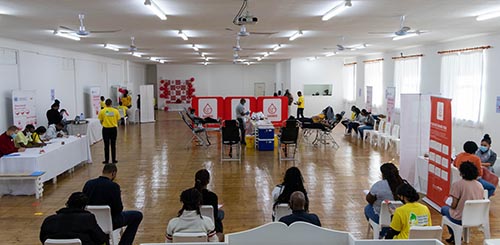Paheja Siririka
More than 600 members of Shincheonji Church of Jesus (SCJ) in Namibia, Zimbabwe and neighbouring South Africa answered the call to donate blood from Saturday 28 May 2022 onwards to help ease the blood shortage in the region.
In April, the Namibia Blood Transfusion Services (NamBTS) pleaded with individuals to come forth and donate blood due to the existing shortage of the body fluid. The available bloodstock was and still is sufficient for a short period.
NamBTS spokesperson Titus Shivute communicated that this has devastating consequences as it means that the blood reserves for patients in hospitals around the country are insufficient, which could lead to a severe shortage if no significant blood donations are made.
“Our daily demand is reaching 200 units. We need to get 200 Namibians countrywide to donate daily to ensure there is sufficient supply. We have also experienced an increase in the demand for blood from the hospitals. More and more patients need blood in our country,” stated Shivute.
He added that they were unable to hold blood drives for such a long time at various institutions, adding that approximately 30% of NamBTS’ total blood volume usually comes from tertiary institutions, training centres and schools, but due to the pandemic, they were not able to host their normal blood drives at these institutions.
“We are thankful to the members of Shincheonji who have come forward to donate blood and help save the lives of so many Namibians in our hospitals and medical centres across the country. We are all observing a time of need – it is a grateful gesture that they have all done to prepare themselves and visit one of our donation centres,” appreciated Shivute.
Blood transfusion is needed for women with complications of pregnancy, such as ectopic pregnancies and haemorrhages before, during or after childbirth. “Children with severe anaemia often resulting from malaria or malnutrition; people with severe trauma following man-made and natural disasters; and many complex medical and surgical procedures and cancer patients need a blood transfusion,” he said in a previous interview with Vital Signs.
“It was really an amazing experience to donate blood. I truly do hope that even the blood will be of good use to save as many lives as possible. I am really encouraged by everyone that came in to actually donate and really help those in need. My hope is that we can continuously be doing this. I encourage everyone to go out in numbers and save lives,” expressed Morenzil Beukes from Windhoek.
The spokesperson of the cathedral said the desire is to assist and alleviate this burden on the national and local blood services, caused by the aftermath of the pandemic and they want to help the community and save lives in this time of shortage.
“I want to help by giving 30 minutes of my time to donate one unit of blood, and hopefully save one or more lives. I am so excited that so many other members have also decided to do the same,” Cleo Solomons, a congregation member of Shincheonji Church.
Another churchgoer Nolwazi Bengu added: “Because our hearts are for helping people, we moved as fast as lightning to organise this blood drive. This is the very least that we can do. Please be encouraged by this and take some time to also come and donate your blood.”
Approximately 18 000 members of the church in South Korea also participated in donating blood since the start of their drive in April. This number was recorded as the largest group of blood donations in the country to date.
The head of the Korean Red Cross Blood Service, Namsun Cho, said in a statement that when the impact of the Omicron reached its peak, Shincheonji Church launched a large-scale blood donation drive.
“It was like rain during the drought. We are surprised that the number of donors exceeded 6 000 in just three days and so many more participated. We appreciate their life-saving dedication,” he was quoted as saying.
The World Health Organisation says blood transfusion saves lives and improves health, but many patients requiring blood transfusion do not have timely access to safe blood, adding that providing safe and adequate blood should be an integral part of every country’s national healthcare policy and infrastructure.


